Some of the names are massive -- Bob Hope, Katharine Hepburn, Gregory Peck, Johnny Cash, Mr. Rogers -- others less so, but we lost many a great performer in 2003.
The keen observer will note that year by year the list of deceased celebrities grows larger -- if this keeps up, we won't have any performers left alive to amuse and edify our children and grandchildren, but the hereafter will be one ripping entertainment fiesta!
On a less flippant note, the age of mass entertainment -- which began with sound recording in the late 19th century and shot into hyper-drive with the advent of film, radio and television in the 20th -- is now more than 100 years old, and with more engines of celebrity-creation came, logically enough, more celebrities. Over time these "extra" celebrities have been aging and expiring, as we are all actuarially prone to do, so there really are more dead celebrities these days.
We come not to bury but to praise those performers of screen, stage and song for whom the year 2003 was their last. We recognize them in the order in which they exited for the last time.
Maurice GibbThe death of Maurice Gibb, 53, was particularly difficult to take: he collapsed with a congenital intestinal condition of which he was previously unaware at his Miami home, had surgery and showed signs of recovery before dying three days later of complications on January 12.
One-third of the Bee Gees ("Brothers Gibb") from Manchester, England, and Brisbane, Australia, with his twin Robin and older brother Barry, Maurice played bass and keyboards and harmonized behind their unique, quavering leads on great, lush Beatlesque pop-rock songs of their own creation in the late-'60s including "Massachusetts," "To Love Somebody," "Holiday," "I've Gotta Get a Message to You," "I Started a Joke" and "How Can You Mend a Broken Heart."
Gibb had a brief marriage to Lulu and a period of personal excess amid a fallow artistic period for the Bee Gees in the early-'70s, before the group made a dramatic turn in direction, got soul, found falsetto, and became the biggest name of the disco era with smash hits "Jive Talkin'," "You Should Be Dancing" and the iconic soundtrack to "Saturday Night Fever," with shimmering ballad "How Deep is Your Love," and dance floor staples "Stayin' Alive" and "Night Fever." The Bee Gees were inducted into the Rock and Roll Hall of Fame in 1997.
Richard CrennaActor Richard Crenna, 76, lost his battle with cancer on January 17. The versatile Crenna played the steely Col. Samuel Trautman, stalwart mentor to Sylvester Stallone's Rambo character in the ripsnorting film series, was Detective Frank Janek in a series of TV movies including "The Forget-Me-Not Murders" and "Terror on Track 9" in the '90s, and also played notably in films "Wait Until Dark," "Body Heat," and as the swaggering gambler who nearly lured Matt Dillon to the dark side in "The Flamingo Kid."
Crenna began his career on television in the early-'50s as a screechy teenager on "Our Miss Brooks," before maturing into Luke McCoy on "The Real McCoys" from '57-'63. Crenna also directed for television and was active with the Screen Actor's Guild.
Nell Carter
A small, stout woman with a large, soulful voice, Nell Carter died of complications from diabetes at 54 on January 23. She began her career as a gospel, then cabaret singer before moving to the New York stage, and in 1977 she starred in the show "Ain't Misbehavin'!", a revue of the works of composer Fats Waller. For her role in the show she received a Tony and later an Emmy for the televised production -- her version of Waller's "Mean to Me" was definitive. Carter was most widely known for her role as the sassy, caring housekeeper to the family of a widower police chief on the '80s sitcom "Gimme a Break!"
Johnny PaycheckCountry music's hard livin', gritty singin' near-legend Johnny Paycheck, of "Take This Job and Shove It" fame, cashed in his earthly chips on February 18. He had been bedridden with emphysema and asthma, and at 64, was an old, old man.
Paycheck, who described himself as a "whiskey-drinking, cocaine-snorting, wild-eyed singer with unkempt hair and a surly frown," recorded 70 albums and had more than two dozen hit singles in addition to "Shove It," his '78 anthem of blue collar pride and anger, including "Don't Take Her, She's All I Got," "I'm the Only Hell Mama Ever Raised," and "You Can Have Her." For better or worse, unlike today's slick "hats," Paycheck lived the rough honky tonk life of which he sang, serving two years in prison for shooting a man in the head in an Ohio bar in 1985, and spending time in a navy brig in the '50s for assaulting an officer.
Fred Rogers
Who was even sure Mr. Rogers was mortal before he passed away from cancer at 74 on February 27? Admit that you were rather startled when you heard of Rogers' departure from the global neighborhood.
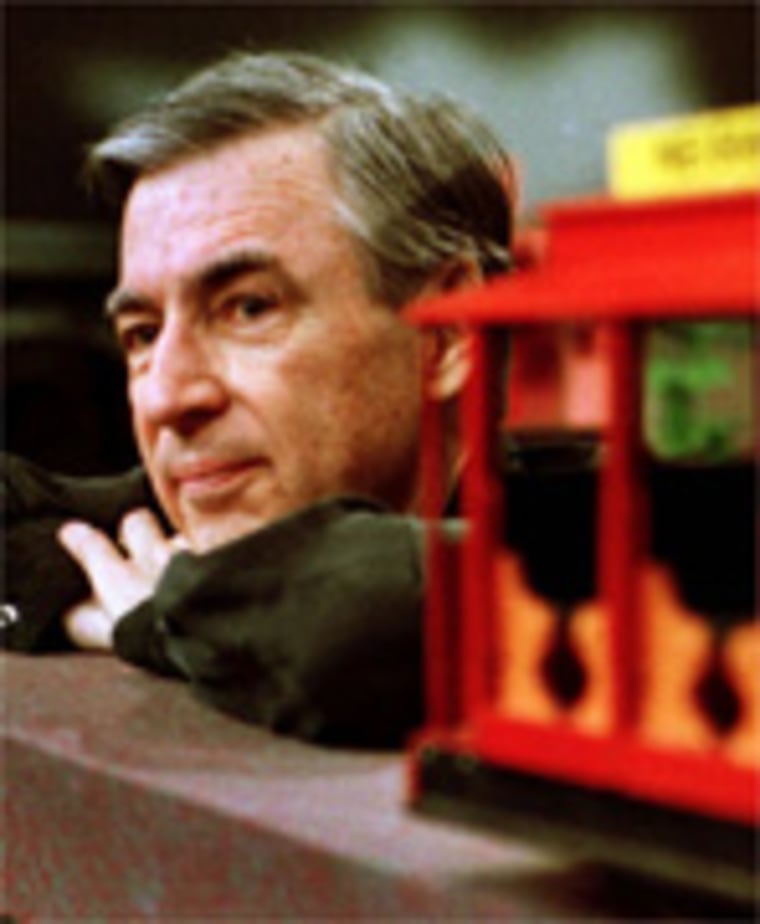
I sat and watched in amazement as my kids -- a pair born in the mid-'80s, another born in '99 -- sat rapt and absorbed this preternaturally calm, gentle, optimistic man in the goofy sweater and sneakers teach his life lessons, make believe, sing his corny songs, and visibly age at about the rate of Dick Clark.
From 1968 to 2000, ordained Presbyterian minister Rogers produced "Mister Rogers' Neighborhood" at Pittsburgh public television station WQED. Fred didn't just play Mr. Rogers on TV, he WAS Mr. Rogers, neither drinking, smoking, nor eating flesh of any kind, and every morning before he swam he stepped onto a scale in his bathing suit, bathing cap and goggles, and the scale read 143 pounds.
Hank Ballard
Rock 'n' roll pioneer Hank Ballard -- who wrote and recorded the original version of "The Twist," the song that ignited the craze -- died of cancer at 75 on March 3. Ballard contributed mightily to the '50s notion that rock 'n' roll was leading the youth astray, writing and recording the risqué trio of "Work with Me Annie" (the biggest R&B hit of 1954, selling more than 1 million copies), "Annie Had a Baby" and "Annie's Aunt Fannie."
In a 1996 interview, the Rock and Roll Hall of Fame member described his personal relationship with music, "If you're looking for youth, you're looking for longevity, just take a dose of rock 'n' roll … Rock 'n' roll is good for the soul, for the well being, for the psyche … I can't even picture being without rock 'n' roll."
Edwin Starr
Perhaps Motown's purest soul shouter, Edwin Starr had three classic hits between '65 and '70: "Agent Agent Double-O Soul," "Twenty Five Miles" and "War." "War! Huh! What is it good for? Absolutely nothin'!" -- the power of Starr's snarling disdain was undeniable, the punch of the stop/start arrangement was visceral. Starr died April 2 at 61 in his long-time home of Nottingham, England, following a heart attack.
Little Eva"Little Eva" Boyd, who irresistibly sang "The Loco-Motion" in 1962 after being discovered babysitting for songwriters Carole King and her husband Gerry Goffin, died of cancer at 59 on April 10. It just seems wrong that someone named "Little" would age and die -- shouldn't the loco-motion go on for ever?
Nina SimoneThe great, sultry, wildly eclectic and sometimes difficult jazz, pop, gospel, blues and soul singer and pianist, Nina Simone passed on at 70 in France on April 21. A classical pianist who studied at New York's Juilliard School of Music in the '50s, Simone auditioned as a pianist at an Atlantic City nightclub and was told she had the job if she would sing as well as play. By 1959 she had recorded her signature tune, the definitive version of Gershwin's "I Loves You Porgy."
Simone was artistically and emotionally fearless, experimenting with pauses and repeated phrases, incorporating shouts, whispers and moans into her delivery to unabashedly convey love, hate, sorrow, joy. A vocal proponent of the civil rights movement in the '60s, she became disenchanted with America and became a permanent expatriate in 1974.
Robert StackActor Robert Stack, who died of a heart attack at 84 on May 14, carved out an impressive career as a convincing, relentless man of the law, most famously in the 1959-63 TV drama "The Untouchables," in which he played Chicago crimebuster Eliot Ness and won a best actor Emmy, as host of the reality series "Unsolved Mysteries," and in numerous screen roles. But he also played off of that image, parodying himself with good humor in "Airplane!", "1941," "Caddyshack II," and "Baseketball."
Gregory Peck
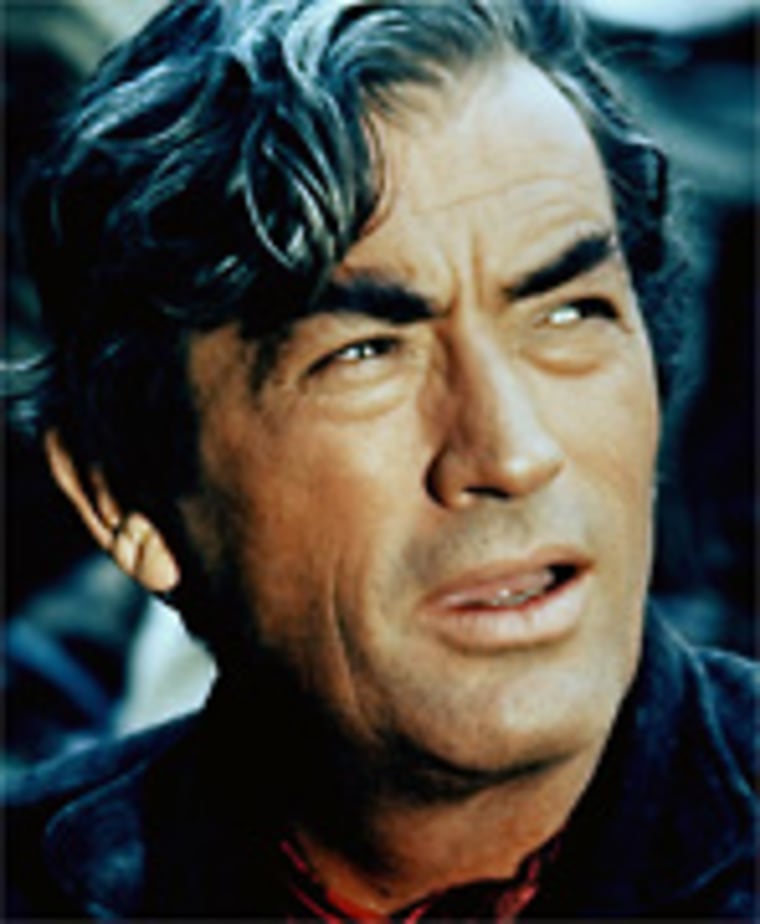
A lanky, deep-voiced, profoundly decent leading man from Hollywood's Golden Age, Academy Award winner Gregory Peck died peacefully June 12 at the age of 87, just days after his Atticus Finch character from "To Kill a Mockingbird" was chosen as the greatest hero in film history by the American Film Institute.
Peck made his film acting debut in 1944's "Days of Glory," and the next year he played a priest in "Keys of the Kingdom," which brought him his first Oscar nomination. Three more nominations followed in rapid succession: for '46's "The Yearling," the family classic about a boy and his pet fawn; '47's best-picture winner "Gentleman's Agreement," in which Peck played a reporter posing as a Jew to expose anti-Semitism in America; and for 1949's "Twelve O'Clock High," where he played a World War II flight leader falling apart under the pressures of command. Among his more than 60 other films were "Cape Fear," "Spellbound" and "Roman Holiday." He also served as president of the Academy Awards body, and was active in the Motion Picture and Television Fund, American Cancer Society, and National Endowment for the Arts.
Hume CronynVeteran screen and stage actor Hume Cronyn, a wiry former amateur boxer who often worked with his wife Jessica Tandy, succumbed to cancer June 15 at the age of 91. The Canadian-born Cronyn was best known in his later years as a feisty oldster in the "Cocoon" movies, but played in over 50 films including Alfred Hitchcock's "Lifeboat," "Phantom of the Opera," "The Postman Always Rings Twice," "Cleopatra," and "The World According to Garp." He won a Tony and three Emmys, including best actor in 1994 for "Hallmark Hall of Fame: To Dance With the White Dog," about an elderly man whose dead wife's spirit (Tandy) returns in the form of a dog.
Katharine HepburnOne of the most towering and iconic leading ladies in film history, Katharine Hepburn -- who died at 96 on June 29 -- brought a unique strength and verve to the screen along with her starkly patrician beauty over a 60-year career that produced a record four Academy Awards (out of twelve nominations) for the films "Morning Glory," (1933), "Guess Who's Coming to Dinner" (1967), "A Lion in Winter" (1968), and "On Golden Pond" (1981). She also starred in "The Philadelphia Story," and the indelible "The African Queen" with Humphrey Bogart, among dozens of others.
Hepburn, born into a liberal, wealthy New England family, was outspoken and unconventional, dressing comfortably in slacks and sweater, red hair piled atop her head. Married once briefly, she was linked to Howard Hughes and others, but the love of her life was Spencer Tracy, who remained married to someone else throughout their 20-year relationship. They made nine films together, the first of which was "Woman of the Year" in 1942. According to legend, when they met she said, "I'm afraid I'm a little big for you, Mr. Tracy." He replied, "Don't worry -- I'll cut you down to size." Perhaps off-screen he did, but a 1999 survey of screen legends by the American Film Institute ranked her No. 1 among actresses -- they don't come much bigger.
Buddy Hackett
Lovable but devilish comedian and actor Buddy Hackett -- he of the squat build, squishy face, bulging eyes, and cartoonish Brooklyn accent -- died at his Southern California beach house on June 30 at 78. Hackett was a top Las Vegas and nightclub comedian for 50 years, a television talk show favorite, and an actor on Broadway and in films including "The Music Man," "The Love Bug," "It's a Mad, Mad, Mad, Mad World," and Disney's animated "The Little Mermaid" as the voice of Scuttle, the ill-informed seagull.
Hackett was invited to join the Three Stooges in 1946 when Curly Howard suffered a stroke, but he chose the solo route, playing the Catskills before heading for Vegas and the big time. For me Hackett's most indelible role was that of Professor Harold Hill's sidekick Marcellus in the 1962 movie version of "The Music Man." He lit up the screen gamely singing and dancing his way through "Shipoopi," an audio version of which is still available on his website.
Herbie Mann
The man who turned the flute into a jazz instrument and later incorporated Latin, African, fusion and world music styles into his far-ranging oeuvre, passed away July 1 from cancer at the age of 73. His group, Family of Mann, formed in 1973, played world music before the name was invented, and his best-selling "Memphis Underground" album was a seminal recording of fusion. A of his other classic albums were "At the Village Gate" (1962), "African Suite" (1959), "Brasil, Bossa Nova & Blues" (1962), "Latin Mann" (1965), and "Eastern European Roots" (2000).
Barry WhiteRomantic soul maestro Barry White, the resonant, lavishly orchestrated Walrus of Love, died of kidney failure on Independence Day at the age of 60. A crack arranger, orchestrator, writer and producer, White's rumbling baritone conveyed an unapologetic sensuality that came wrapped in the swirling strings of his Love Unlimited Orchestra ("Love's Theme") and was transported on a firm, funky beat. His run of classics in the sexy '70s included "I'm Gonna Love You Just a Little More Baby," "Can't Get Enough of Your Love, Babe," "You're the First, the Last, My Everything," "It's Ecstasy When You Lay Down Next to Me." Revived in the '90s, especially by the "Ally McBeal" show, White ended up selling over 100 million records.
Buddy EbsenThe man behind the heard-but-not-seen Tin Man in "The Wizard of Oz," wise nouveau riche hillbilly Jed Clampett, and wizened detective Barnaby Jones, actor, dancer and author Buddy Ebsen died of pneumonia on July 6 at 95. The tall, lanky youngster learned to dance at his father's Florida dancing school, and after a stint in medical school headed for New York in 1928 to trod the boards with his sister, where the striking duo was noticed and brought to Hollywood for "Broadway Melody of 1936." In one of the most famous non-appearances in screen history, Ebsen had an allergic reaction to his Tin Man makeup and was forced to leave the set of "The Wizard of Oz," replaced by Jack Haley. His voice can still be heard on the soundtrack, though, singing "We're off to see the Wizard" with Dorothy and the Scarecrow.
Benny Carter
Remarkable composer, arranger, bandleader, and multiple instrumentalist best known for work on saxophone, Benny Carter's career spanned all the eras of jazz from his first "hot" recordings in the 1920's to his jubilant improvisations of the 1990's. Carter died at 95 on July 12. In addition to leading his own bands, Carter wrote and arranged for Fletcher Henderson, Chick Webb, Benny Goodman, Glenn Miller and Count Basie in the '30s and '40s. He also arranged almost every major jazz singer of the '50s and '60s, including Billie Holiday, Ella Fitzgerald, Sarah Vaughan, Lou Rawls, Ray Charles, Peggy Lee, Louis Armstrong, Pearl Bailey, Billy Eckstine and Mel Torme.
Celia CruzOne of the wildest looking women on the planet, the great Cuban salsa singer Celia Cruz died July 16 at 78 of a brain tumor. Cruz studied music at the Havana Conservatory and performed at the world-famous Tropicana nightclub before leaving Cuba for the U.S. after the revolution of 1959. She never returned.
Cruz helped bring salsa music to a wide audience with her clarion voice and flamboyant stage shows. She also worked with fellow salsa star and "Mambo King" Tito Puente, the Fania All-Stars (Afro-Cuban music collective that recorded for the Fania record label in the 1970s), Ruben Blades and Willie Colon. She recorded more than 70 albums, earned more than a dozen Grammy nominations, and won best salsa album for "La Negra Tiene Tumbao" at this year's Grammy Awards.
Bob HopeComedian, actor, singer, dancer, American Institution, Bob Hope lived a life as long as it was large before succumbing to pneumonia on July 27 at the grand age of 100. Thanks for the memories, Bob.
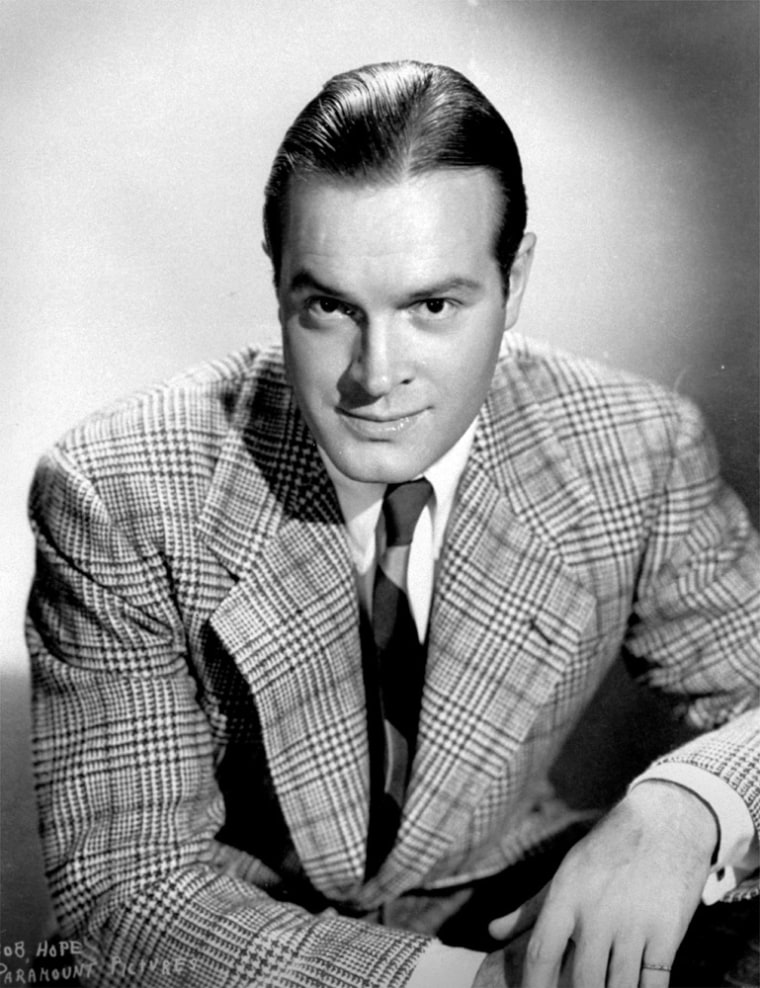
Hope's self-deprecating humor, usually in the form of a masterful one-liner, made it easy to forget how good he was at virtually every form of mass entertainment of the 20th century. He began singing, dancing and joking on the vaudeville circuit, starred on the Broadway stage, made more than 75 movies and more than 1,000 radio shows, and became a fixture in living rooms across the nation with 475 programs over five decades of television specials.
Controversial to some was Hope's sub-career entertaining U.S. troops during World War II, Korea, Vietnam and on through the 1991 Persian Gulf War, but Hope was not an advocate of war, he was an advocate and admirer of the troops. As a measure of Hope's stature, President Bush issued a proclamation calling him one of the nation's "great treasures" and declared that flags at U.S. government facilities around the world would be flown at half-staff on the day of Hope's burial.
After vaudeville and starring in the Broadway musical "Roberta" in 1933, Hope advanced to film with "The Big Broadcast of 1938," in which he teamed with Shirley Ross on the Oscar-winning song "Thanks for the Memory" -- it would be his signature theme for the next 65 years. Hope's film career shifted into high gear with the wildly popular series of "Road" movies with Bing Crosby, including "Road to Singapore," "Road to Morocco" and "Road to Rio." Perhaps his finest film performance was delivered in 1948's "The Paleface," in which he uttered the timeless line, "Brave men run in my family."
Though he was perhaps not the very best at any one of his many talents, overall, Bob Hope was the most important, pervasive and beloved American entertainer, and certainly comedian, of the 20th century.
Gregory HinesThe outstanding tap dancer, choreographer, actor and singer Gregory Hines died of cancer on August 9 at 57 -- his glorious feet are now sadly silent. Hines, who through sheer talent and enthusiasm was more responsible than anyone for the revival of tap in the '80s and '90s, won the 1992 Tony Award for best actor in a musical for "Jelly's Last Jam" -- his other Broadway musical triumphs include "Sophisticated Ladies" and "Eubie!"
In the 1989 film "Tap," some of Mr. Hines' tap heroes, including Sammy Davis Jr., Sandman Sims and Harold Nicholas, appeared with him in the story of a man bound by the tap tradition. Continuing that tradition, Hines was an inspiration to the next generation of tappers including Savion Glover, the savant behind "Bring in 'da Noise, Bring in 'da Funk."
Hines was also a fine dramatic and comedic actor, appearing in a number of films including "Running Scared," "White Nights," "Waiting to Exhale," "The Preacher's Wife" and "A Rage In Harlem." On the TV comedy "Will and Grace," he was Will's despotic boss and danced a tap routine on one episode. He also starred in his own late-'90s sitcom "The Gregory Hines Show."
Charles BronsonOne of the more unusual movie stars in Hollywood history, Charles Bronson, the powerfully built, craggy faced tough who punched his way to the top, died of pneumonia at 81 on August 30. Who knew he was that old? It seems only yesterday he was crushing scum as a vigilante architect in the "Death Wish" film series, but Bronson didn't really become a star in America until he was 50 years old. My favorite Bronson supporting role was as the only surviving convict in "The Dirty Dozen" (1967); my favorite of his leading roles was in "Hard Times" (1975), Walter Hill's directorial debut about a taciturn street fighter in New Orleans in the '30s.
Bronson was hugely popular in Europe, where the French knew him as "le sacre monstre" (the sacred monster) and the Italians as "Il Brutto" (the ugly man). In 1971 he was presented a Golden Globe as "the most popular actor in the world," but it would be difficult to imagine anything less likely based upon his early years as Charles Buchinsky, the 11th of 15 children of Lithuanian immigrant parents, all of whom lived in a shack in the southwestern Pennsylvania coal town of Ehrenfeld. He escaped the mines when he was drafted to serve in World War II, and after the war he joined the Philadelphia Play and Players Troupe.
His first film role was as a sailor in the 1951 comedy "You're in the Navy Now" starring Gary Cooper. He was featured in a number of excellent films in the '60s: "The Magnificent Seven," "The Great Escape," "The Battle of the Bulge," "The Sandpiper," but he had to go to Europe to become a star in Adieu, L'Ami" ("Farewell, Friend") and the spaghetti western, "Once Upon a Time in the West." His American starring films include "The Valachi Papers," "The Mechanic," "The Stone Killer," "Mr. Majestyk," "Breakout," and "Telefon."
Warren Zevon

Warren Zevon, among rock's most distinctive, enduring and disturbing songwriters and sonorous baritone singers, spent his life wrestling with the angels of creativity and compassion and with the demons of self-abuse and cynicism. Zevon battled terminal lung cancer for an entire year before finally giving out on September 7 at the age of 56. He responded to news of his "impending doom" with courage, humor, humility and a stunning final album, "The Wind."
"The Wind" is at once a summation of Zevon's career and a life-affirming celebration of the joys of music-making. It bursts with creativity, his own and that of his dearest friends and contemporaries, including Bruce Springsteen, Jackson Browne, Don Henley, Tom Petty, Emmylou Harris, Ry Cooder and David Lindley. Among Zevon's earlier classic tunes are such jaunty odes to the macabre as "Werewolves of London," "Excitable Boy," "I'll Sleep When I'm Dead," and "Life'll Kill Ya." Though best known for his dark humor, I equally cherish Zevon's songs of tender sincerity and emotional insight, including "Hasten Down the Wind," "Carmelita," and "Accidentally Like a Martyr."
John Ritter
Similar to the death of Maurice Gibb at the beginning of the year in its stunning unexpectedness and pathos, actor and comedian John Ritter collapsed from a previously undetected condition in his heart (an aortic dissection) on the set of his sitcom "8 Simple Rules for Dating My Teenage Daughter" on September 11, and died later that evening. He was 54.
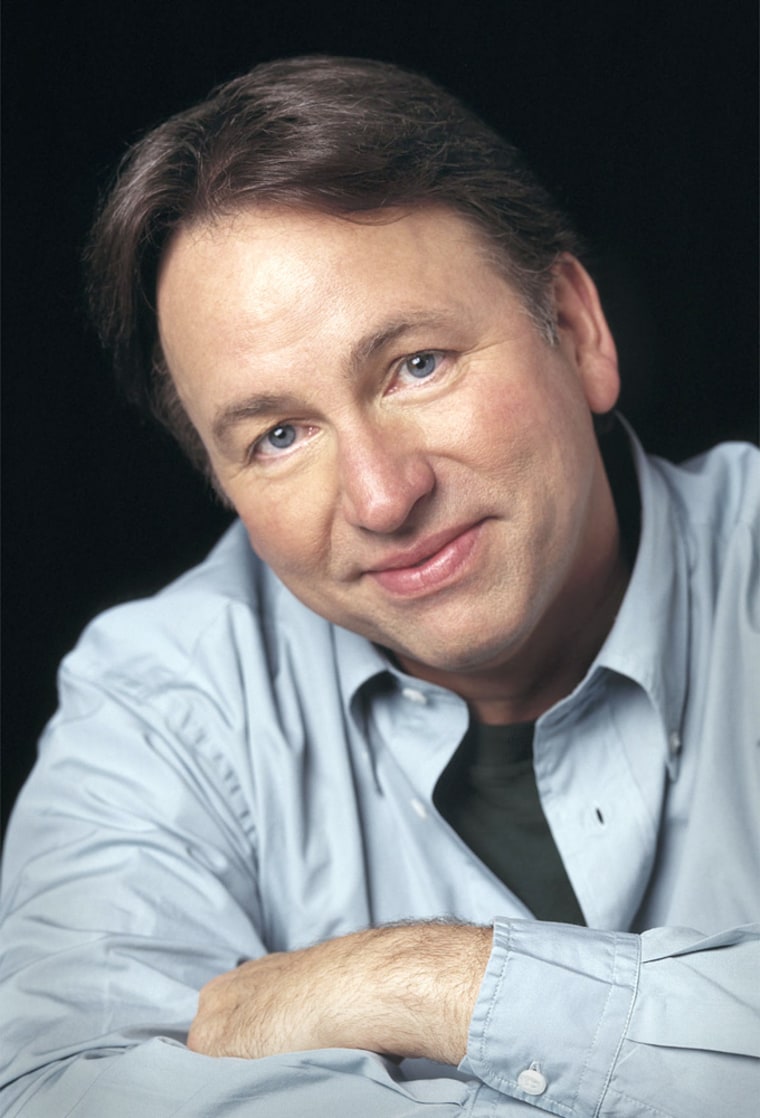
Ritter was best known for his role as Jack Tripper on the long-running television sitcom, "Three's Company," which brought him an Emmy and allowed him to demonstrate his outstanding skills as a physical comedian. He also starred in the late-'80s series "Hooperman" (produced by Steven Bochco), the early-'90s show "Hearts Afire," and had roles on many television series including "The Waltons" and "The Mary Tyler Moore Show." Ritter was nominated for an Emmy for an appearance on "Ally McBeal," and for two as the voice of Clifford on the PBS animated series "Clifford the Big Red Dog."
The youngest son of country music legend Tex Ritter, John was also a serious film actor, most impressively as a gay friend of the family in Billy Bob Thornton's cult classic "Sling Blade" in 1996 -- he rejoined Thornton for the scabrous Christmas parody "Bad Santa," currently in release.
Johnny CashThe great Man in Black, Johnny Cash, died early in the morning of September 12 in Nashville. The official cause was complications from diabetes, but we all know he just didn't have the strength without his beloved wife of 35 years, June Carter Cash, who had died four months earlier on May 15. Some love songs are sung with life.
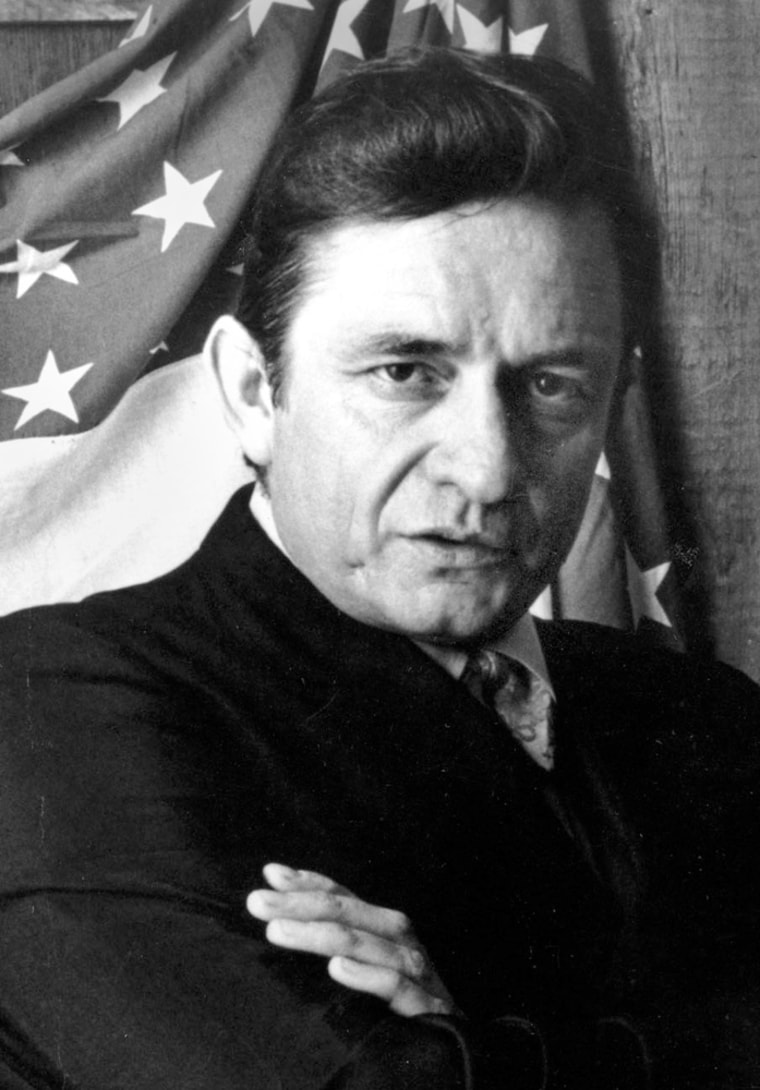
Although Cash couldn't have been more contemporary musically, he was physically old as the hills at 71 -- his body had been giving out on him for several years -- and emotionally he was bereft without June. On the musical front, Cash won a Grammy (his 11th) this year for best male country vocal performance on "Give My Love to Rose," and posthumously in November he won the Country Music Association's video of the year and single of the year awards for "Hurt" from his album "American IV: The Man Comes Around," for which he also won album of the year. Ironically, these were his first CMA awards since 1969.
Another profound moment in this most poignant of years for the Cash family involved Johnny's oldest daughter, Rosanne Cash, a Grammy-winning artist herself with 11 No. 1 country songs to her credit. Johnny and Rosanne's duet, "September When It Comes," was written by Rosanne with John Leventhal (her husband and producer) and appears on "Rules of Travel," her superb most recent album, released earlier this year.
When Leventhal suggested she record "September When It Comes" with her father, Rosanne was at first reluctant, but then warmed to the idea and asked him to do it. He agreed and the resulting song is a sparse reflection on mortality, both uplifting and autumnal:
"When the shadows lengthen
And burn away the past
They will fly me like an angel to
A place where I can rest
When this begins I'll let you in
September when it comes"
Perhaps the most remarkable thing about the Man in Black's remarkable career, and the key to his five decades of achievement and relevance, was his elemental relationship with so many strands of American roots music: country, western, folk, rockabilly, even blues. Johnny Cash was the very definition of Americana, and it came through on his greatest songs, "Folsom Prison Blues, "Ring of Fire," "I Walk the Line," "The One On the Right Is On the Left," "A Boy Named Sue," "Daddy Sang Bass," "Get Rhythm," "Jackson," and on and on. Johnny's soul-deep gravely voice will sing forever.
Robert PalmerThe very definition of smooth, sophisticated British elegance who came to the fore in the video-centric '80s, Robert Palmer was a great soul-rock singer who had hits in three decades with rocking "Bad Case of Loving You," smoking, insinuating "Addicted to Love" (one of the most famous rock videos of all time, with Palmer in a suit, backed by fashion models dressed and moving identically), kinetic "Hyperactive," tongue-in-cheek "I Didn't Mean to Turn You On," "Simply Irresistable," and the soulful medley of Marvin Gaye tunes, "Mercy Mercy Me/I Want You." He died of a heart attack September 26 at the age of 54.
Palmer also teamed up with former Duran Duran members in the '80s to form short-lived new wave supergroup Powerstation, which had two ripping songs in "Some Like It Hot" and "Get it On (Bang a Gong)." Equally compelling but less well-known was his '70s New Orleans/Caribbean effort with members of Little Feat, "Sneakin' Sally Through the Alley."
Bobby HatfieldJust months after being inducted into the Rock and Roll Hall of Fame, singer Bobby Hatfield, the tenor half of the legendary Righteous Brothers duo, died of a heart attack, November 5, at the age of 63 in his Michigan hotel room, less than an hour before the Brothers were scheduled to perform a concert.
"Blue-eyed soul" pioneers in the '60s, Hatfield and his low-baritone partner Bill Medley teamed up with producer Phil Spector's Wall of Sound on timeless sound-and-passion sculptures "You've Lost That Lovin' Feeling" (the most programmed song in American radio history), "Just Once In My Life," "Unchained Melody," "Ebb Tide," and post-Spector, "(You're My) Soul and Inspiration." They had a big comeback in the mid-'70s with "Rock and Roll Heaven," "Give It to the People" and "Dream On."
Hatfield's solo vocal on "Unchained Melody" was done in one take when he was just 25 years old. The majesty of his performance has only broadened and deepened with time, and when it was featured in the film "Ghost" in 1990, a new generation was astonished by its grace, power and nuanced perfection. Had Hatfield sung nothing else in his career, he would still be immortal.
Art CarneyBarring the unforeseen, we wrap up the year somberly with the passing of the most excellent Art Carney on November 9 -- he was 85. Carney was best known for his indelible, performance as the loose-limbed, cheerfully skewed sewer worker ("underground sanitation expert" in Norton-speak) Ed Norton to Jackie Gleason's Ralph Kramden in the long-running TV series "The Honeymooners." He won three Emmys for the part. Carney also won an Academy Award for best actor for his moving performance as a widower who strikes out across country with his cat in 1974's "Harry and Tonto."
Eric Olsen is the editor of .